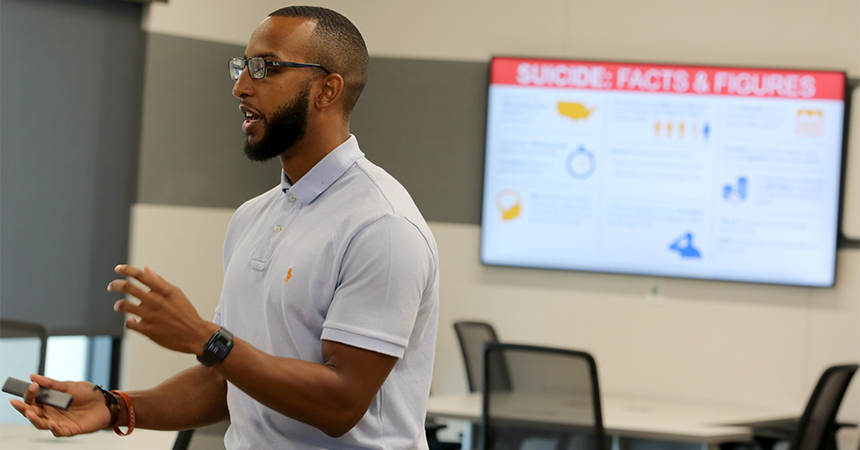At HSC, saving lives means making suicide everyone’s business
Every 11 minutes there is a death by suicide in the United States.
In 2019, more than 47,500 people died of suicide and 1.4 million attempted suicide, according to statistics gathered by the U.S Centers for Disease Control and Prevention.
Experts at The University of North Texas Health Science Center at Fort Worth (HSC) are working to prevent suicides. While this work goes on all year, it took center stage as part of HSC’s outreach during National Suicide Prevention Week (Sept. 5 – Sept. 11).
“Suicide is everybody’s business,” said Jeremy Joseph, Assistant Director for the Office of Care and Civility at HSC.
That message was reinforced during a recent workshop aimed at training people to intervene when they believe someone is contemplating suicide.
“You can be that person who intervenes,” Joseph told a group of students during a Question Persuade Refer (QPR) workshop made possible through a collaboration with The Jordan Elizabeth Harris Foundation.
The foundation’s work honors the life of Jordan ‘Jo’ Elizabeth Harris, a North Texan who died of suicide in 2012.
The training includes encouraging people to confront anyone suspected of planning a suicide, looking for suicide warning signs and steering people to resources and experts for help.
Finding the personal courage to ask someone if they are contemplating suicide is the key to saving lives.
“Don’t put it off,” Joseph said. “Ask. You never know when you will get another opportunity.”
Knowing suicide warning signs is also key to helping people, Joseph said. These signs can include comments such as: “I just want out” or “I’m tired of life, I just can’t go on.”
Additionally, if a person’s actions or activities change, it might be a sign that he or she needs help. For example, dropping out of social media, reckless behavior or feelings of hopelessness.
Joseph said it is important to look for situational clues too. A person who was expelled from school, faces family problems or is the victim of bullying might be prone to considering suicide.
In the work to prevent more suicides, the main message is to make sure the person knows there is help.
“Let them know you want them to live,” Joseph said.
For more information
The HSC Office of Care and Civility’s Care Team is available to help. The Team supports students by connecting them with resources and serving as an on-campus source of support.
On-call phone number: 817-735-2740.
Email: careteam@unthsc.edu
For emergencies, call 911 or HSC Police at 817-735-2600.






Social media